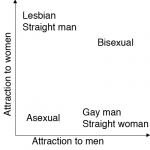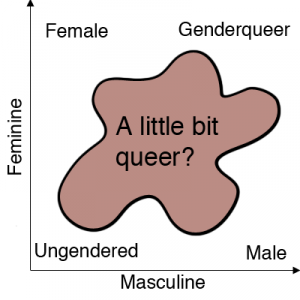Thanks to “Freedom of Information Queen”, Emma Brownbill, a number of us have been in possession of the minutes of the so-called “Gender Governance Group” (or G3) from 2003 to the present. This is a group consisting of clinicians mostly working in the east midlands and north of England, as well as Scotland and Northern Ireland, who are working in the field of gender dysphoria. They’ve been meeting twice a year for the last eight years, and I imagine many trans people might wish we could be a fly on the wall in these meetings.
Well now, thanks to the wonders of the Freedom of Information Act, we can be! The whole set of minutes are vast, full of administrivia, and take a long time to read. Here, for your delectation, I have presented an excerpt. Zoe O’Connell and Emma Brownbill herself have also blogged on this, and we timed our releases to occur simultaneously. Their entries are here and here.
In general, the minutes present a bunch of people who seem to be generally well meaning, but are disturbingly ill-informed about the range of transgender identities. Their desire to maintain paternalistic style control over trans people is quite apparent, but they do seem to want to do the right thing (even if I sometimes profoundly disagree with what the right thing is – many of them seem to still be in the “prevent transition unless it’s absolutely necessary” mindset).
More recently, they seem to be on the receiving end of a trans community with patients who enter the services with high expectations and with a good understanding of their rights in law. This appears to be causing some considerable flailing amongst the G3 clinicians, and I do sense they’re getting rattled. Anyway, on with the show. It starts somewhat slowly, but do stick with it – some of this stuff is really quite shocking:
April 2004
“Local issues discussed including patients being referred from other clinics and if the assessment has to start from the beginning and if so does the patient have to go through the Real Life Experience again.”
This is the “bad old days”. This question isn’t answered, but it’s apparent from something that is said later on that the answer is quite often, “yes”.
Pickings are quite thin at first. The group is in its infancy and the meetings seem short and preoccupied with admin issues. Fast forward to:
November 2005
[Dr Kevan Wylie, specialist in gender identity disorder working at Sheffield Gender Identity Clinic] had received an email from the [Royal College of Psychiatrists] about an application to a Member of Parliament asking if they could be noted as “no gender” and wanted to know if it was a recognised condition. Kevan had discussed it at a previous meeting but no one had heard of it before and said he would bring it to the G3 meeting.
Tim Terry [vaginoplasty surgeon working at Leicester] said there was a condition called Scoptic Syndrome where they don’t want to be either sex but want to lose the penis and testes.
This is appalling. I transitioned in this month, by coincidence, so I was doing a lot of searching around online for transgender medical resources. Genderqueer and non-binary gender issues were not as prominent as they are now, but there was stuff there, and I came across it quickly. For a specialist clinician working in the area not to be aware of non-binary people is bad enough. For the body supposedly writing a UK Standards of Care document (more on this shortly) to not know of the existence of non-binary people is utterly scandalous. Sadly, this non-binary blindness and resistance to anything other than “traditional binary transition” seems to persist onwards.
By the way, “Scoptic Syndrome” appears to be something akin to dyslexia! edit: It’s a typo – see comments.
For myself, I am aware of a number of cases locally to me who can’t get referred to a gender clinic because they have non-binary identities. It seems that the old advice that you have to lie to clinicians to get treated is still valid for non-binary people. There are a few who are clueful, and we mostly know who they are. Otherwise, beware.
March 2006
[The Royal College of Psychiatrists (the people who had never heard of gender neutral people 4 months earlier, remember?) had circulated their final draft of their Standards of Care document for comment.
You read it right – despite them already apparently realising they don’t actually have much of a clue about the range of transgender identities that exist, they’re trying to put together a document that describes the care pathway in the UK. This terrifies me.
Kevan said that due to NHS waiting times Sheffield would not be intending to provide support to the prisons.
Yeah, whatever. Prisoners are expendable and stuff anyway, right? Just ask the Daily Mail. Serves them right for stealing a loaf of bread and breaking a window pane, or something.
November 2006
Kevan Wylie reported that Helen Barker, Student Doctor carried out a survey, with a small select group and asked about how they felt about complying with the ‘Real Life Experience’. It was found that overall patients felt it was very important.
Of course, patients are going to tell the people who can STOP THEIR TRANSITION AT ANY TIME the complete truth, and not what they want to hear, or anything.
Many patients had raised the issue that they had not been advised fully regarding [scrotal] hair removal prior to their [vaginoplasty] surgery.
This should be explained – if you don’t get that done, you risk vaginal hairballs. These are not funny – they can result in a permanent infection and severe surgical complications. What does “not advised fully” mean anyway? Is it the same as “not told”?
November 2007
Leeds expressed concern over surgery due to Leicester being closed to new referrals. Leicester expressed views on that they were not aware of this…
Riiiight. Left hand, meet right hand. This isn’t the only time this happens, as we shall see.
October 2008
[Northampton’s] main problem is patients who come into the service who are already taking hormones bought off the internet. This raises the issue of whether to stop the patient taking them. If this is the case it does depend on how long they have been on them and the individual case. The patient would be told if they are buying hormones it is against medical advice. [Dr Deenesh Khoosal] told the group a patient parted from their service as a way forward could not be reached as they were receiving injections from the internet.
It was noted that Nottingham would start a patient from the “start” even if they had been in the private sector, whereas Leeds will continue a patient on hormones following assessment if they are able to provide evidence that they are meeting criteria for hormone treatment. etc. Nottingham added that they would not take a patient off hormones.
This is serious. Around half of trans people are on hormones before our first appointment at a clinic, for various reasons. Being made to come off them is brutal. Discharging people because they refuse to is disgraceful.
March 2009 – This is … well
[Dr Deenesh Khoosal] spoke to the group about the issue of unintentionally creating ‘she-men’: patients who have breasys and are on hormones but don’t have final surgery as they don’t want to go any further. These patients continue to live full time as female but with male genitalia. Many of the services present at the meeting had examples of this happening.
This is the level of understanding of gender issues of some of the people treating us. Not only do they seem oblivious to non-binary identities, but they have apparently appointed themselves the genital police. If somebody is non-operative, that is no business of their gender specialist, and does not make them a “she man” or a “he woman” or any other transphobic slur.
October 2009
Orchidectomy [castration]
The Leeds service had reported that they have seen an increase in patients requesting for this. […] the team was wary about patients who only want orchidectomy.
Again, the obsession and fear about trans women keeping our penises. What is wrong with these people? They’re supposed to be helping us.
The Chief Executive for the Department of Health has recently written to every lead reminding them of their responsibilities legally with regards to trans care.
April 2010
Kevan is of the opinion that we as professionals are not gatekeepers unless there are mental health problems or for monetary making reasons.
Or if you want to keep your penis, or dare to take hormones that we didn’t prescribe, or (continued, pp. 94-106)
Entry into GIC
Leeds are recommending for a recent (within 12 months) mental health, together with evidence of physical examinations, plus full bloods.
Nottingham accepts primary care referrals and then asks GPs to carry out physical examinations
As has recently come to light, “physical examinations” means “GP inspects genitals”. The only person who inspected mine was my surgeon. There’s really no reason to insist on this. It’s degrading and unnecessary.
October 2010
York
Vast increase in size of university population, resulting in demanding youngsters being referred. Waiting list is currently four and a half years, most students only at Uni for three years. This means the service users are arriving very unhappy and then going to London for treatment.
The clinician working at York actually seems very upset about this – she’s getting almost no support from the local NHS. A waiting list of four and a half years though. Four. And. A. Half. Years.
Dr Beaini wanted clarification for a patient who has got a GRC already and they have been gender dysphoric for 25 years. Now they have asked for phalloplasty, do they need to seek second opinion or not?
Been in Leeds Gender Clinic for a while and been treated. 20-25 years gender reassignment, done mastectomy etc.
[…]
GRC is not an access to surgery. Need a one to one assessment with the patient. Readiness and robustness is a must. The way they are presenting, they are not robust enough
Yes, here is someone who has been transitioned for two decades. They’ve had mastectomy, they are legally male. They are presumably living their life, but they won’t be referred for surgery because their gender-presentation is “chaotic”. I think that at 2 decades, they might have proven that they’re serious about transition, no?
Equality Bill(SIC – it was actually the Equality Act by this point)
Glasgow would like to know how gender services are going to adapt to the changes. The bill is now allowing that anyone with gender issues are covered by the same legal as discrimination [That was almost English]. Will this have an impact on the services? The easy answer is we are covered by WPATH and standards of care. We are a medical health.
Glasgow currently have a patient who has highly intellectualised the gender issues, he is biological male and in between somewhere. No evidenced based to treat it, but knows he(SIC) rights and how can he be treated.
Equality bill only mentions the male to female or female to male.
So much wrong with this. They seem actually hurt that trans people have legal rights – surely our lives belong to them! HOW DARE a patient “intellectualise” their gender issues. Note also the continued cluelessness about genderqueer issues – “in between somewhere”.
March 2011
North East
A group of young people under 18 created a voice and demanded a service.
My god! They’re at the gate with boiling oil. These people are revolting!
Leicester
Surgery is cheaper on private than it is on the NHS.
I tried to tell my PCT this back in 2007, and they refused to believe me.
Amal reported that surgeons stopped taking mastectomy referrals and no-one told Leeds – they heard from their patients.
Again, the left hand doesn’t know what the right hand is doing.
October 2011
Leeds have struggled recently with GIRES putting pressure on them regarding hormones and real life experience. There is need to clarify RLE for future. Leeds clarified that they have two stages of RLE, the stage before hormone and assessment 6 months, RLE 2 years before surgery.
That’s right – they make people undergo social transition for 6 months with no medical support. They’re then flabbergasted when people self medicate, and increasingly arrive demanding to be treated with a modicum of human dignity. GIRES are a trans activism and research organisation. Leeds seem almost upset that their “turf” is being intruded upon by trans groups.
[On the new WPATH SoC]
RLE, eligibility and readiness – been completely removed from the SoC […] Amal gave an example of a patient from Leeds going to the GMC.
Leeds also pointed out that the DoH leaflet, doesn’t reflect what they do. When they didn’t do what it said in the leaflet, they got harassing emails which wasn’t very pleasant.
This is almost comedy gold – WPATH, the organisation responsible for publishing the global standards of care document, has moved on and realised that the way we have been treated in the past has been inappropriate. The department of health seems to have certain expectations too. Here we see clinicians realising the world is moving on without them, and desperately trying to hang on to the past.
[On the Equalities and Human Rights Commission’s recent document looking at trans healthcare in the UK]
Sheffield, Leeds or Nottingham confirmed that they haven’t been contacted for any information. The teams are not happy with this document.
Note the bemusement. It’s almost as if government departments and equality bodies are talking to trans people (I know they are – we keep in touch regularly), without honouring the unwritten rule that we belong to the medical professionals who treat us.
As I said coming in, these people seem to be generally well meaning, but the way they talk about us to each other suggests a way of looking at us that ignores our humanity and is incompatible with our equalities and rights aspirations.
These people are dinosaurs, and they haven’t realised that the comet they can see is heading straight for them.
 Taking things in a different direction was Michael Storms, who proposed that “attraction to men” and “attraction to women” can be considered two independent variables. I think this improves dramatically on one of the main issues I have with Kinsey and Klein – that they see a spectrum with “straight” at one end and “gay” at the other. Instead, Storms suggests, you can be attracted to men and attracted to women in different proportions. The diagram on the right (click to enlarge) illustrates this. One thing it does which Klein and Kinsey don’t do so well is takes asexuality into account.
Taking things in a different direction was Michael Storms, who proposed that “attraction to men” and “attraction to women” can be considered two independent variables. I think this improves dramatically on one of the main issues I have with Kinsey and Klein – that they see a spectrum with “straight” at one end and “gay” at the other. Instead, Storms suggests, you can be attracted to men and attracted to women in different proportions. The diagram on the right (click to enlarge) illustrates this. One thing it does which Klein and Kinsey don’t do so well is takes asexuality into account.

